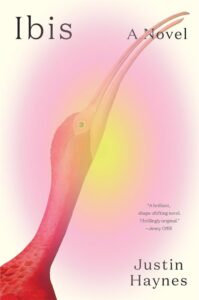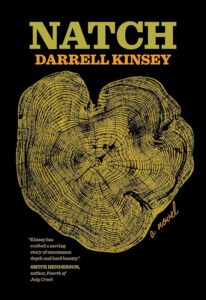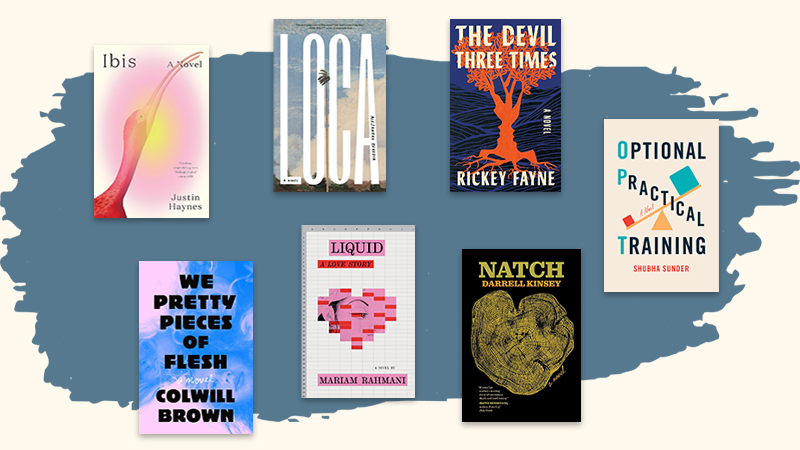
Meet the Best Debut Novelists of the Year
The Seven Finalists for the Center for Fiction First Novel Prize Dish on Their Reading and Writing Lives
In September, the Center for Fiction announced the shortlist for their annual First Novel Prize, which celebrates debut novels and seeks to support early career writers. The shortlisted authors will each be awarded $1,000 and the winner, who will be announced in December, will receive $15,000 “in recognition of their contribution to contemporary literature and in support of their ongoing creative career.” In the meantime, Literary Hub caught up with the finalists to ask them a few questions about their reading and writing lives. Here’s what they told us:
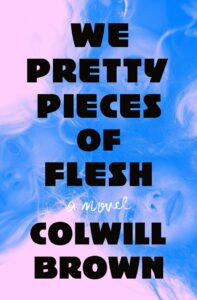
Colwill Brown, author of We Pretty Pieces of Flesh
Who do you most wish would read your book? (your boss, your childhood bully, etc.)
With any luck my exes will read it and be stunned by its brilliance and flagellate themselves endlessly for having ever let me go.
How do you tackle writer’s block?
I keep a list of ideas to staunch the fear of running out.
What’s the best or worst writing advice you’ve ever received?
Best: “Write the novel only you could write.” This seemed impossible advice to follow at first, but I’m glad I kept trying. Worst: “Show, don’t tell” can mess a writer up for years. It makes you afraid of using exposition, which is like trying to drive a car if you’re afraid of pressing the pedals. Once I made friends with “telling,” figured out how to get a character from one end of the room to the other in less than five paragraphs and a day’s hard graft, storytelling felt much lighter. Prose became supple, nimble—I felt like I could take the story anywhere I wanted it to go.
Who is the person, or what is the place or practice that had the most significant impact on your writing education?
No practice can have a more significant impact on your writing than writing. The rest is reading and community.
What part of your writing routine do you think would surprise your readers?
I have an unpredictable, untreated chronic illness; routines of any kind are largely notional. Every day I try to get through my survival routine. If there’s anything of me left after that, I’ll write.
Which non-literary piece of culture—film, TV show, painting, song—could you not imagine your life without?
The Blackadder series and Suzy Eddie Izzard’s stand up. They taught me comedy, tragedy, history. They were hilarious without ever punching down. We broke into Blackadder or Izzard riffs so often in my house that for a solid decade you couldn’t communicate with my family unless you had at least a working knowledge of the canon.
What was the first book you fell in love with?
My mum reckons I was four months old when I fell in love with the Mothercare catalogue. I didn’t have the structural integrity to hold myself upright, so she’d prop me up with pillows to stop me falling off the sofa and I’d use my little ham fists to turn the pages, responding with amazement at what I found printed on each one.
Which book(s) do you reread?
My own?! (Out of necessity, obviously, and narcissism.) Otherwise, hardly any. I find it difficult to return. I read slowly, annotate heavily; by the time I get to the end of something, I usually feel as though I’ve had a complete experience.
What is your favorite way to procrastinate when you are meant to be writing?
I don’t really avoid writing. I write to avoid other things, like sleep, responsibility, and the sun.
What book has elicited the most intense emotional reaction from you (made you laugh, cry, be angry)?
This year I cried the most reading Hardly Creatures by Rob Macaisa Colgate. For the inducement of sheer rage, it’s hard to do better than Unwell Women by Elinor Cleghorn (due to the enraging nature of the history of women’s health).
How do you decide what to read next?
Make extensive lists and colour-coded plans then say “fuck it” and read whatever grabs me. I’m always trying to plug the vast holes in my understanding of what literature is—what knowing is—but reading is also comfort, so I have to balance challenge with rest.
What’s one book you wish you had read when you were young?
Hard not to feel like an imposter around novelists who were devouring Austen and Dickens as kids. I read every single Sweet Valley High my library stocked, plus the dozen Mills and Boons I bought at the jumble sale for 10p a pop when my grandma wasn’t looking. It’s the literary equivalent of eating crisps and sweets for an entire childhood.
If you weren’t a writer, what would you do instead?
In the words of David St. Hubbins, I’d just be a full-time dreamer.
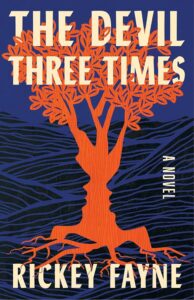
Rickey Fayne, author of The Devil Three Times
What time of day do you write?
I write in the morning. If I can get started before the sun is up it’s a good day but if I open my eyes and its already light outside, I know it’s going to be a struggle.
How do you tackle writer’s block?
I’ll let you know as soon as I find out.
What’s the best writing advice you’ve ever received?
The best writing advice I ever received was from Elizabeth McCracken and it was to retype everything between drafts. At first, I thought it would be a waste of time but really, it’s a game changer. You have so much more control over your sentences.
What part of your writing routine do you think would surprise your readers?
I listen to music when I write and every once in a while, I’ll hear a song, imprint on it, and play only it on repeat for the next three or four days.
What was the first book you fell in love with?
Song of Solomon by Toni Morrison. I read it my freshman year of college. I started late one afternoon and stayed up all night reading it. I grew up in a small southern almost town that was named after my family and it was the first time I saw that experience represented in the book.
Which book(s) do you reread?
Edward P. Jones’s All Aunt Hagar’s Children. The first story, “In the Blink of God’s Eye,” in that collection floored me and whenever I need inspiration I reread it. It’s a novel’s worth of character building and action crammed into a short story.
What is your favorite way to procrastinate when you are meant to be writing?
I have a Gilmore Girls problem. Sometimes I turn it on while I’m making coffee just as background noise and then, it’s an hour or so later and I’m sitting there hating Logan and waiting for Jess to get his act together.
How do you decide what to read next?
I have a huge back log of TBR books. When I finish one, I read the first few pages of a couple and see which ones speak to me.
Justin Haynes, author of Ibis
How do you tackle writer’s block?
I have a dusty little manual Corona that I bought for a song about a decade ago. What a find! Putting the effort into striking those keys angries up the blood and gets the ideas going. Highly recommend.
What’s the best or worst writing advice you’ve ever received?
The best pieces of writing advice I ever received were from Victor LaValle and Chris Offutt. I use them each time I sit down to write! But I was sworn to secrecy; complicated handshakes were involved. I really can’t betray their trust. So…maybe go out in public and eavesdrop?
What part of your writing routine do you think would surprise your readers?
That my best ideas come while out on runs. Then I have to stop and dictate the ideas into my watch. I feel ridiculous—a mix of Dick Tracy and David Hasselhoff circa 1982. I keep expecting a screeching Trans-Am to pull up next to me.
Which non-literary piece of culture—film, TV show, painting, song—could you not imagine your life without?
Prince’s music. The tracks are mind-bending, but thinking about his work ethic and output is rocket fuel. Also, MF DOOM and Biggie.
Which book(s) do you reread?
The novels that I teach in my college courses. The irony is that I no longer teach my favorite books because a long time ago students called one fave boring. I gave them all Fs and now, for everyone’s mental health, I just teach mid novels. You did it to yourself, kids! (And that’s why it really hurts.)
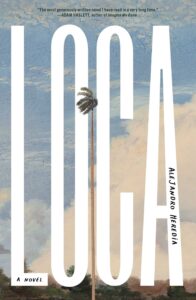
Alejandro Heredia, author of Loca
Who is the person, or what is the place or practice that had the most significant impact on your writing education?
My investment in writing about neighborhoods, my ear toward various vernaculars, my desire to write about working class people with the gallant breadth they deserve—all of it is informed by the fact that I grew up in The Bronx.
Which book(s) do you reread?
A Visitation of Spirits by Randall Kenan, Maurice by E.M. Forster, White Teeth by Zadie Smith, Wide Sargasso Sea by Jean Rhys, To the Lighthouse by Virginia Woolf. I probably spend too much time rereading books I love.
What book has elicited the most intense emotional reaction from you (made you laugh, cry, be angry)?
Atonement by Ian McEwan destroyed me. I imagine it’s to do with my Catholic upbringing—I’m very moved by a person’s failed attempts at being good. I cried a lot for Briony. True atonement feels impossible, but the point is to try.
How do you decide what to read next?
The past few years I’ve made it a habit to select a few writers at the top of the year and I try to get through their body of work. I tried and couldn’t get through all of Don DeLillo. I loved reading through most of Gayl Jones. This year I read all of Jean Rhys, and most of Clarice Lispector’s work. It’s useful to see how a writer grows, changes, and experiments throughout their career.
If you weren’t a writer, what would you do instead?
I’d be a community organizer. I have this severe need to be of service. Selfishly I tell myself I’m doing so through writing. But really, being of service to one’s community IRL, through child care, mutual aid programs, activism, whatever—that’s the only thing that matters.
Darrell Kinsey, author of Natch
How do you decide what to read next?
One time I found a book in the middle of the street. I won’t say what book it was because I didn’t care for it very much, and when I had gotten through the first few chapters, I understood how it must have ended up in traffic like that.
I also like to find books in vacation rentals. I found Sycamore Row by John Grisham in a beach condo on the Gulf. I had never read a John Grisham book before, or any kind of thriller. I would never have picked it out on my own, but I enjoyed it very much. I felt like I had discovered John Grisham, though I was aware that lots of people had heard of him already.
The English Patient by Michael Ondaatje I found by wandering through the shelves at the public library. I picked it up and read the first few pages and was entranced. I’ve read it four times now.
Sometimes my wife, Anna, picks out books for me. She gave me a handsome cloth-covered edition of Chess by Stefan Zweig that I read straight through in about two hours on Christmas morning.
What time of day do you write?
I like to write in the early morning for about one hour. The morning is for serious writing and refinement and for major swapping of sentences. Other faster writing comes at other times of the day. I might tap out on my phone a few paragraphs that arrive without warning. These arrivals could prove to be trash or they could show up in pretty good shape.
What is your favorite way to procrastinate when you are meant to be writing?
We recently moved into a house with a small pond in the back. It has been hard to keep me away from the water. I go out fishing in a green kayak. The rumor is that a former neighbor on the other side of the pond was a professional sport fisherman. He would bring his catches home from the larger lakes and release them in our pond. I believe I caught a brilliant black crappie that must have been his, though it’s hard to say for sure.
How do you tackle writer’s block?
Plans for stories have gotten piled up in my head over the years. I wouldn’t say I suffer from traditional writer’s block, the kind where you’re just sitting there not knowing what to type, but I do suffer from severe problems in organizing the passages. They are like puzzles to solve, how to change certain situations and details to make the events appear in a practical yet pleasing sequence. This is very much a type of block. If it’s past four in the afternoon, these are problems I cannot seem to solve. Sometimes the solution will arrive by morning.
If you weren’t a writer, what would you do instead?
I’ve been drawing pictures. I get the measuring cups out and trace the edges. I might trace other items I find around the house, usually with pen or pencil, then I fill in the shapes with watercolor. They’re just messy little abstracts, but I like dealing with shapes sometimes as a relief from words and language. I used to try drawing representational pictures, but that was frustrating because I was not very skilled and because I was obligated to reproduce something recognizable. I used to minimize the importance of abstract art, but now I have a better understanding of its purpose. Sometimes it’s liberating to make a wild new shape that can’t be called by any words.
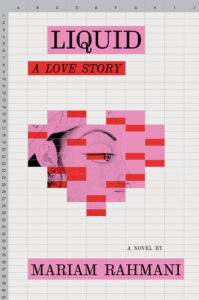
Mariam Rahmani, author of Liquid
Who do you most wish would read your book?
Books are for strangers!
What time of day do you write?
Morning, always morning. Otherwise too much of life—personal, professional, the news—is crowding my attention.
How do you tackle writer’s block?
For me the issue is creating enough space to write. That means time to think as well as the space to concentrate: to stop thinking about whatever else is going on at work, inside me, etc.
What’s the best or worst writing advice you’ve ever received?
A lot of my teachers from various walks of life have recommended just putting in the time. Sit there and see what happens.
Who is the person, or what is the place or practice that had the most significant impact on your writing education?
Being a reader—I’ve always been one and never thought of it as a practice; I just love doing it.
What part of your writing routine do you think would surprise your readers?
Maybe how boring it is? I have no tricks. No quirks.
Which non-literary piece of culture—film, TV show, painting, song—could you not imagine your life without?
I learn a lot about pacing and plotting by watching movies. But in terms of just joy, I like a museum. It’s not about any particular medium but the space itself: they’re modern temples.
What was the first book you fell in love with?
I don’t know about love but growing up with the Quran was formative for me. Its cadence; its always being there, in the background or the foreground. Moreover, the idea that a text can be holy, can be God’s word. Affording a book that much respect—in some sense, idolizing poetry—made my relationship to literature what it is.
Which book(s) do you reread?
Anna Karenina in various translations is one. Plus “rereading” a bunch of stuff on audiobook; going back to literature’s roots as spoken and heard, rather than read.
What is your favorite way to procrastinate when you are meant to be writing?
Reading, of course.
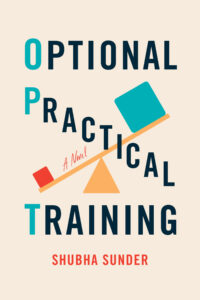
Shubha Sunder, author of Optional Practical Training
How do you tackle writer’s block?
I don’t believe in writer’s block. If something’s not working, I amputate the sentence/paragraph/chapter and start again.
What’s the best or worst writing advice you’ve ever received?
Best advice, from Emily Dickinson: “Tell all the truth, but tell it slant.”
Which non-literary piece of culture—film, TV show, painting, song—could you not imagine your life without?
Satyajit Ray’s Apu Trilogy, violinist and composer L. Subramanium’s Journey, Chopin’s Prelude Op 28. No 15 played by Lang Lang.
What was the first book you fell in love with?
Charlotte’s Web. It took the subject of death and loss seriously, which in turn made me—I must have been 6 or 7 at the time—feel taken seriously.
Which book(s) do you reread?
A House for Mr. Biswas by V.S. Naipaul, Aftermath by Rachel Cusk, The Rings of Saturn by W.G. Sebald.
What is your favorite way to procrastinate when you are meant to be writing?
I don’t procrastinate when it comes to writing. Sometimes I need to warm up or take a break by walking around, staring into space, making coffee… but I don’t think of those things as wasting time. I’m a procrastinator when it comes to chores—tidying up, email, paying bills–because I’d much rather be writing.
If you weren’t a writer, what would you do instead?
I’d be a brewmaster.









